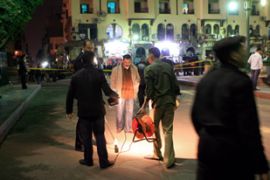Three arrested over Cairo bombing
Police say a hand-held explosive suspected in the Khan el-Khalili bazaar attack.

Egyptian, French, German and Saudi nationals were injured during the blast on Sunday night in the popular Khan el-Khalili bazaar.
Police said initial evidence suggested a small explosive device, such as a hand grenade, had been thrown from an overlooking balcony.
Earlier reports had said bombs were planted under a seat near a cafe just outside the al-Hussein Hotel.
Motives unclear
The motive for the attack remains unclear and no one has claimed responsibility.
Police later detonated a second device without causing any injuries.
| In depth |
|
|
Blood stains could be seen in the front courtyard of the mosque, next to the famed bazaar.
“I was praying and there was a big boom and people started panicking and rushing out of the mosque, then police came and sealed the main door, evacuating us out of the back,” Mohammed Abdel Azim, who was inside the mosque at the time, said.
Amr el-Kahky, Al Jazeera’s correspondent in Cairo, said some analysts had suggested a link to Israel’s offensive against Gaza last month, in which Egypt was criticised in the Arab world for not opening its Rafah border crossing with Gaza and not doing enough to help the Palestinians.
Government unpopular
Speaking to Al Jazeera, Samer Shehata, an expert in Arab politics from Georgetown University in the US, said it was unlikely that the attacks were carried out by a purely Egyptian group.
“It could have been Egyptians or a group that is affiliated to al-Qaeda or sympathetic to the international terror network,” he said, adding that the Egyptian government had taken a very unpopular position during the Gaza war.
Shehata pointed out that attacks in the past had targeted Egyptian tourism because it was one of the country’s leading sources of revenue and employment.
The historic district was the scene of a previous bomb attack in 2005 in which two tourists were killed and 18 wounded.
“Hitting the tourism sector is a direct blow to the state. The fact is previous attacks have also occurred in this sector, as opposed to targeting government officials or buildings,” Shehata said.
Khalil Alamany, of the Al Ahram Centre for Strategic Studies in Cairo, however, said it was unlikely that the attack was carried out by a large organisation, but rather by “just a few number of people who are trying to punish … the Egyptian regime by [hitting] one of the main sources of national income”.

 Video: Tourist killed in blast
Video: Tourist killed in blast